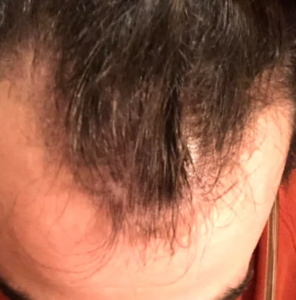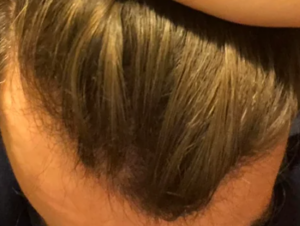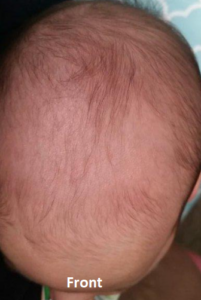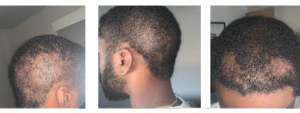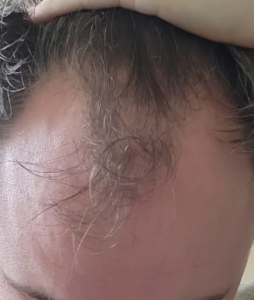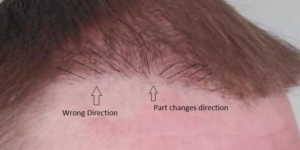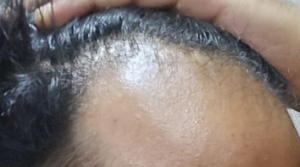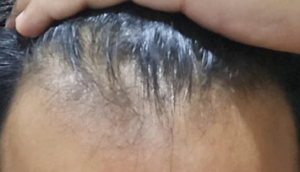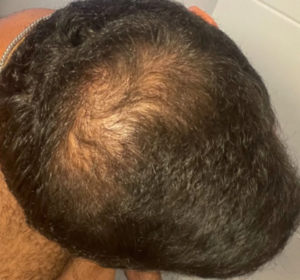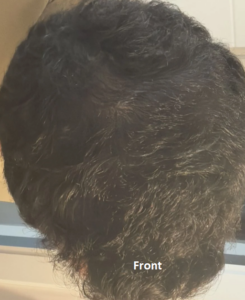One month? You are unrealistic if you were expecting significant benefits from finasteride in a month. Give it 9-12 months and then you should see either slowing, stopping or some or all reversal of the hair loss.
If I apply 0.1% 1 ml solution of topical liposomal finasteride daily. That would mean a dose of about 1mg.
If I apply 0.1% of 2ml solution daily. That would mean a dose of about 2mg. Is this what you mean or would I have to change it to 0.05% to keep with the 1mg dose? I believe you have mentioned that about 5% or 18% of the medicine goes systemic. Which one of these would be the better estimate?If you have the time I do have a few more questions:
If my hair loss still regresses, is there a point in increasing the dose? If so, by how much and what would be the limit? Also in your experience how effective is 0.1% for people around my age and does it actually reduce the chances of side effects?
Finally, although I know they are rare, I wanted to get some clarification on the side effects:
I have mild gynecomastia left over from puberty. Does that make me more likely to get finasteride-induced gynecomastia?
Can long-term use of finasteride cause side effects like infertility? If so, in your experience do these always go away once the mediation is stopped?
- I only prescribe the Liposomal form of topical liposomal finasteride, not regular topical finasteride, and step-wise, increasing the dose from 0.01% over a year to the 0.1% ideal dose. I don’t know if I agree with your math. From a practical point of view, what I do works.
- The ideal dose, in my experience, is 0.1%
- I have seen rare reports of side effects that can be offset by lowering the dose to 0.01%
- Juvenile gynecomastia usually doesn’t increase the risk when taking finasteride as an adult or late teen.
- Finasteride is not known to cause infertility, but there are reorts of reduced sperm count for men on finasteride.
- Fertility side effects usually go away in a couple of months after stopping the oral finasteride.
Ive had pretty lame results with minox only the past 8 months so I decided to add microneedling a month ago (.75m once a week with .3mm for topicals 2x a week). Ive been having a pretty big shed as a result and dont know if this is a sign to stay on. I did have an initial minox shed when i first got on min but there wasnt much regrowth after, so Im hoping this would be different.Thoughts?
You should understand that the scalp epidermis is 0.5mm thick, so if you go less than 0.5mm with microneedling, you are not reaching any hair stem cells; in fact, you are not reaching anything. With your 0.75mm length, you are barely going through the scalp’s epidermis. The stem cells that need to be reached are about 1.0- 1.7 mm below the surface of the scalp, so that is why I recommend a depth of 1.25mm to reach those stem cells that control hair growth cycling. The shed may have nothing to do with your microneedling.
They gave me a little certificate upon completion of the transplant with a redo guarantee of the results are poor, I still have it. But I cannot just go back to turkey, the plane ticket there was more expensive than the procedure. I told them I wanted a refund but they gave me the run around for legit 2 months, I got tired of it and ripped into them real bad. After that, they declined to give me a refund and they keep telling me no
The value of seeing a doctor in your country is that you always have recourse, either to get your money back or take action against the clinic that did this to you. A solution, if this is older than 6 months, which in your situation is so, then SMP is part of your solution, but don’t get ripped off doing this again, get a reputable group to do this for you, one that does both transplants and SMP.
The donor hair thickness’s value will dictate the graft quality and quantity you need. Men with coarser hair require fewer grafts and get better results than men with fine hair who require more grafts; even with more grafts, the difference between the results is significantly different. In Turkey, most of the clinics (not physician-run nor driven by such factors that I mentioned above) do not do this analysis but deplete your donor area regardless of your needs.
This is a widespread error for surgeons performing a hair transplant. Hair is often placed like the spokes of a bicycle, circularly. In this particular man, the mistake was for half of his right hairline; however, I often see the entire hairline created this way. When a man has straight hair, such errors create a freaky look. See where half of the right frontal hairline points in the wrong direction. I drew straight lines in the photo to show the error.
I’m 21 and I want to get a hair transplant. My Norwood class of balding is a Class 3. I met with one doctor who wanted to do 4000 grafts on me. What do you think?
At 21, you should not do any hair transplants. Your balding pattern will not be clear, and the use of your donor supply by sloppy doctors may deplete your donor supply before knowing where your balding is going. Get a Personalized Master Plan from a good hair doctor, first and foremost. Too many Class 3 and 4 patients get megasessions and eat up their donor supply before they complete their balding process. Being deformed from bad planning for the rest of your life is not a good thing!
You appear to be a good candidate, assuming that you have already tried some of the other non-surgical treatments and that they have failed. Do you have miniaturization on your scalp beyond the hairline area? Ask your surgeon about your baseline donor density and hair mass (donor hair thickness). These two factors will allow you and your surgeon to predict how you will manage if you continue to lose more hair (likely). If your surgeon can’t answer these questions, could you find another surgeon who will? You must remember that the surgeon works for you, and as such, in a job interview (you being the interviewer), you need to ask the right questions and expect reasonable answers. If the surgeon gets upset with your questioning why he is offering you surgery, then get the hell out of there because you shouldn’t want to hire such a doctor. If you only meet with a salesman or saleslady, then run for the hills.
FYI: Juvenile hairlines are not uncommon. In Caucasians, they are less than 5% (e.g., Bill Clinton), while in India, they may reflect 25% of the male population. My Grandfather died at 102 with his 5-year-old hairline and black hair (no gray).
I am in the situation where I am quite good looking (sometimes get asked if i’m a model when wearing a hat), but genetically have a terrible hairline. My hairline has been like this as long as I can remember. It’s a problem that’s been bothering me greatly since I was 13 already, always wearing a “justin bieber hairstyle” to cover it up, being scared of wind, etc. Hair loss fairly minimal. Recently I decided to get a transplant and put down a deposit. Plan is to lower the hairline a bit, fill in temples, maybe temporal peaks (undecided). 2700 grafts planned for hairline and temporal peaks. However, I’m not totally sure if it’s worth it. The things I am worried about:
Lack of density in the transplanted hairline.
Botched/failed transplant (surgeon is quite reputable but you never know).
FUE scars on my head.
Transplanted hairs falling out /not growing properly.
Transplanted hairs falling out after 5+ years,
I have previous experience doing a rhinoplasty to straighten my broken nose from boxing and I’m not very happy with the result (although its not terrible). I know that reality and what people write on the internet can be very different from my own case, and I really regret doing that procedure. Is it actually possible that I will do the surgery and end up with a result I’m satisfied with, a lower hairline with nicely dense looking hair I can style in any way? Or is it more likely I’ll end up with an inferior result and be sprinkling toppik into my fake hairline
I would REALLY appreciate some answers as I’m quite on the fence. In case there’s a decent chance transplants are overhyped and likely end up semi-botched, I’d rather just stick with the hats than worry about covering up my transplant for the rest of my life. But in the case that I could simply do it and have a great result and go out with a normal hairstyle, that would be life-changing. So it’s a difficult decision for me. Thank you so much.
Are you balding? Is this a hairline recession? You can alleviate these concerns by getting a good, honest, competent surgeon to evaluate you. The questions you ask here should be asking of the surgeon. A good surgeon will measure your donor supply, donor density, and hair mass to set up your expectations. You need to know more about what your balding pattern might evolve into, assuming that you are in some stage of the balding process. A good examination by a surgeon will help guide you here. This is what I do and have done for 33 years, and I have done it on some of the wealthiest people in the world and many, many celebrities from Hollywood.
My shedding from starting finasteride is still happening 6 months since I started the drug. What should I do?
Drug-induced shedding usually stops in a month, rarely 2 months. See your doctor and find out what the cause of your shedding is as it may not be the drug but some acceleration of your hair loss.
When did you see results after using oral dutasteride and/or oral minoxidil
These drugs start working almost immediately. Remember that hairs that are miniaturized and benefit from these drugs have to grow from their base, a process that takes up to a month or so before they emerge from the scalp. If you plucked one of these hairs at, say, four months, you would see a wider shaft at the bottom (the new growth) and a smaller shaft on the upper part (the miniaturized component of the hair). Sometimes it takes up to 18 months to see the value from finasteride.
I would wait until all of the healing is complete on the recipient area. That would take 3 months.

